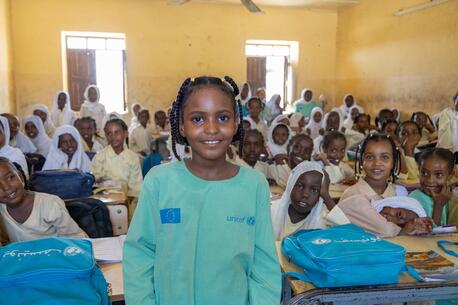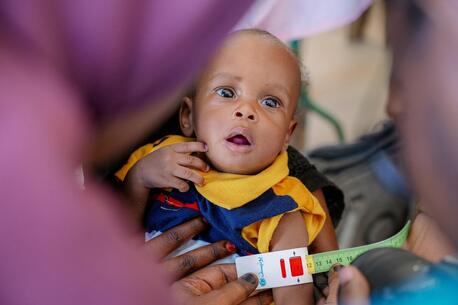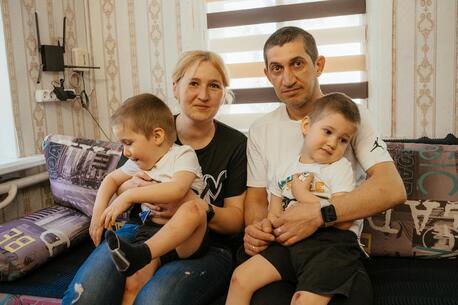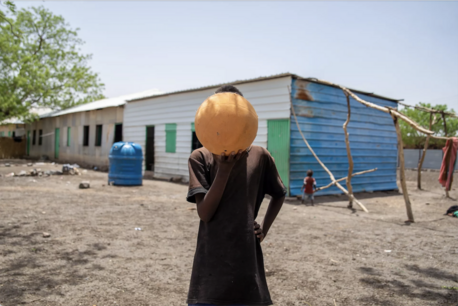
For the Love of Soccer in Sudan
Separated from his family by Sudan's brutal civil war, a boy leans into his passion for "the beautiful game" to keep his spirits up.
Children across Sudan continue to pay a devastating price for the conflict
After more than a year of brutal civil war, over half of Sudan's 24 million children – some 14 million — are in urgent need of humanitarian assistance. A rapid deterioration in food security has created a devastating hunger crisis on a scale not seen since the Darfur crisis in the early 2000's. Almost 90 percent of school-age children are out of school; more than 4 million kids have been forced out of their homes by the ongoing violence.
At a camp for internally displaced people in Gadaref state, It's rare to see a smile on 13-year-old Mohammed’s face, even after numerous jokes. But when conversation steers towards his favorite game — soccer — he lights up with an unexpected, wide smile. Next to him is an orange ball that his hands and legs gravitate to while he chats.
The old ball lacks sufficient air to support a complete match. Nonetheless, when the children gather, they kick it up and down, and it continues to serve its purpose.
Mohammed’s love for the sport isn't something new. It dates back to his time at home in Gezira state, where he played soccer with his friends, something he deeply misses.
“I enjoy playing soccer. I like to play it so much,” he says, beaming.
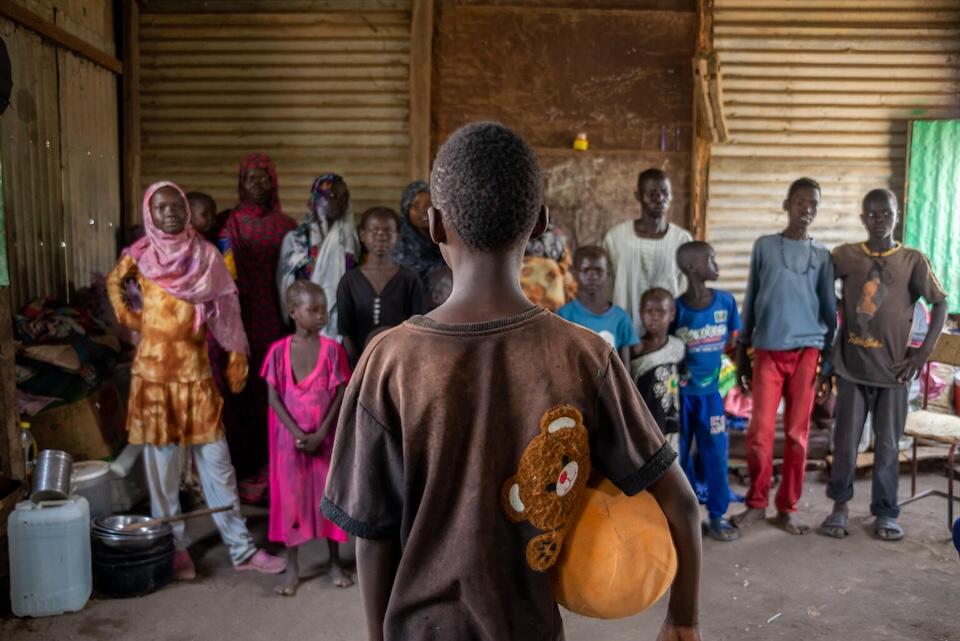
UNICEF child-friendly spaces give children a safe place to play, learn and just be kids
The UNICEF supported child-friendly space that Mohammed attends daily has provided him with a safe space where he and his peers can engage in a game he treasures.
During conflicts, UNICEF and its partners create child-friendly spaces where displaced children can play, learn, sing, interact and feel safe again. In Gedaref, Mohammed has found and embraced such a space, which continues to help him rediscover his childhood dream of becoming a famous footballer.
“The thing I love most at the child-friendly space is soccer,” says Mohammed.
When he is not playing soccer, Mohammed spends time chatting with his newfound friends, all displaced by the ongoing war. Occasionally, they take walks to the market and climb the nearby mountains for adventure.
A sudden departure, followed by loss and displacement
The day his family was displaced started like any other, but quickly turned into a nightmare when heavy shooting intensified, forcing Mohammed and his father to flee. The war had finally reached their home, making it unsafe. They had to leave quickly, making difficult decisions about what to take and what to leave behind.
Afraid of leaving his animals, Mohammed’s father asked his son to flee with a neighbor while he chased the animals. What Mohammed didn’t know was how long it would be before he would see his father again.
On the road, he attempted to turn back when he realized his father was nowhere in sight. "But the shooting was heavy, so he couldn’t. He continued the journey with us,” recalled the neighbor, Abdalla, who is now Mohammed's guardian.
“My father told me that he would bring the cows. He told me to proceed and that he would follow shortly,” Mohammed recalls, sadly.
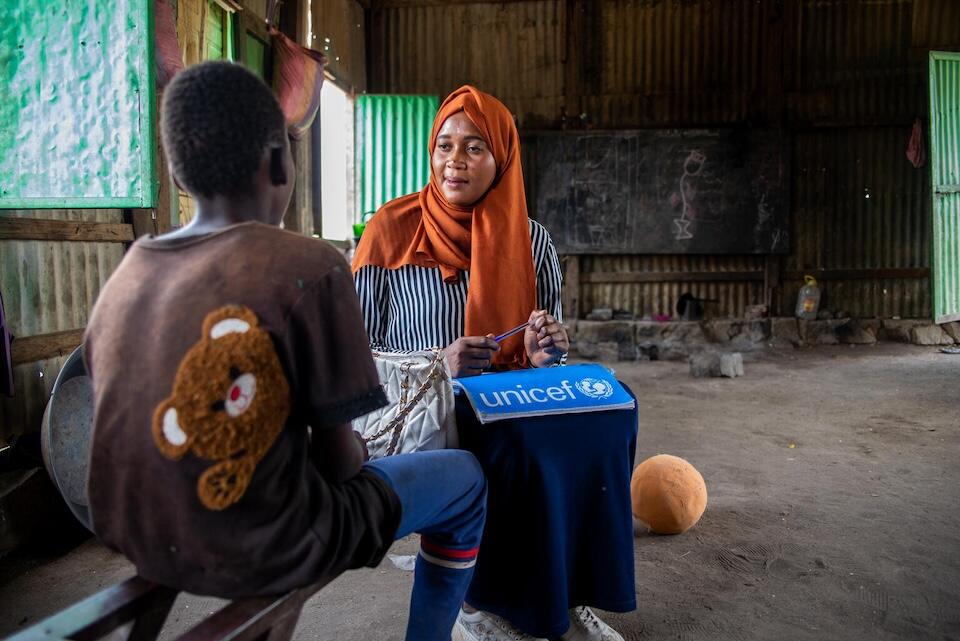
It has been six months now. During the early days after their separation, Mohammed's dad was able to communicate with him, but frequent telecommunication shutdowns have made it impossible to connect. Every passing day, he worries about his father, mother and siblings left behind. No one has seen or heard from them.
Through social workers at the child-friendly space, unaccompanied children like Mohammed are identified, registered, provided with psychosocial support and visited frequently to assess progress of their well-being as they trace their families.
UNICEF supports and protects unaccompanied and separated children
UNICEF defines unaccompanied children as those that are separated from both parents or primary caregiver and other relatives, while separated children are separated from both parents or primary caregiver but not necessarily from other relatives.
During conflict, many children become unaccompanied or separated from their parents as a result of the displacement journey or the loss of their parents. As they lack the protection of adults responsible for them, unaccompanied and separated children are often exposed to higher protection risks such as violence, abuse, gender-based violence, exploitation and trafficking. It is estimated that of all children displaced in Sudan, about 4 percent are unaccompanied and separated.
Today, Mohammed remains under the guardianship of Abdalla and his family in a makeshift structure at an internally displaced people’s shelter that also doubles as a child-friendly space. Their needs are immense, surviving on just one meal a day with little bedding to cover the children, including Mohammed, at night.
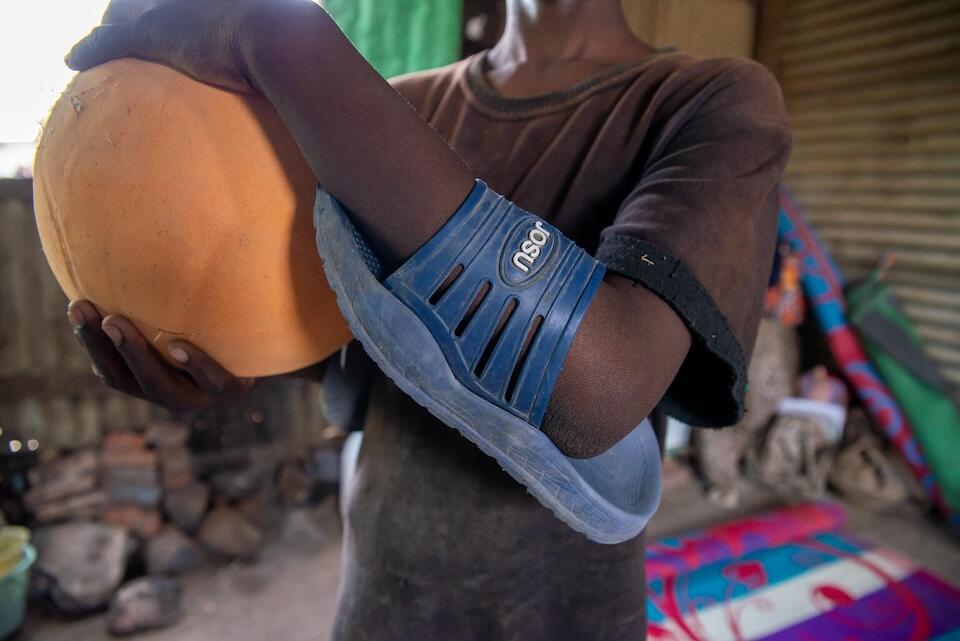
Mohammed benefits from regular visits with Asmhan, a social worker from Depth Action Organization, UNICEF’s implementing partner. They discuss several issues, but his persistent request is to return home and be reunited with his father and the rest of his family. Together, they find solutions to tough questions posed by Mohammed, a true testament to the resilience of frontline workers like Asmhan that continue to support children navigating new challenges brought on by the war and displacement.
What concerns me most is my family; I miss them so much. When I see them again, I will be very happy. I will hold them very tightly and cry with them. — Mohammed, 13
“What concerns me most is my family; I miss them so much,” Mohammed says, with tears in his eyes. “When I see them again, I will be very happy. I will hold them very tightly and cry with them."
Since the start of the conflict, UNICEF has been working to strengthen the social service workforce to identify and document unaccompanied and separated children to support family reunification or provide alternative care, placing them with foster families.
Keeping his dream alive
As he waits for the day he will see his family again, Mohammed immerses himself in the sport that brings him so much happiness. At every opportunity, he leads his peers in a soccer game, selecting different teams, the referee and the space. Given his knowledge, his peers follow his lead. He is the master of the game. When the match is over, he carries his ball around almost everywhere.
His love for Real Madrid, a Spanish team, will not fade, nor will his dreams of becoming a professional footballer and an architect, who will someday build a house for his family and help to rebuild his country.
He holds onto his dreams as he waits for the day he will see his family walk through the door.
Sudan's child displacement crisis is the world's largest
“The war is creating a lethal combination of displacement, disease and hunger — the perfect storm for a conflict-induced famine and the catastrophic loss of children’s lives,” UNICEF Executive Director Catherine Russell said in a statement issued June 26, following a visit to Port Sudan.
“Whether trapped between the front lines, forced from their homes or witnessing their communities torn apart, children’s lives have been turned upside down. This is the biggest child displacement crisis in the world. Children do not start wars, but they pay the highest price. We need the world to know what is happening to the children of Sudan and insist that all parties stop the violence and end this war.”
Learn more about UNICEF's response to the humanitarian crisis in Sudan.
UNICEF is providing urgent assistance to Sudan's children, but more help is needed. Your contribution will make a difference. Please donate.
* Mohammed's name has been changed to protect his privacy.
This story was adapted from unicef.org
HOW TO HELP
There are many ways to make a difference
War, famine, poverty, natural disasters — threats to the world's children keep coming. But UNICEF won't stop working to keep children healthy and safe.
UNICEF works in over 190 countries and territories — more places than any other children's organization. UNICEF has the world's largest humanitarian warehouse and, when disaster strikes, can get supplies almost anywhere within 72 hours. Constantly innovating, always advocating for a better world for children, UNICEF works to ensure that every child can grow up healthy, educated, protected and respected.
Would you like to help give all children the opportunity to reach their full potential? There are many ways to get involved.



